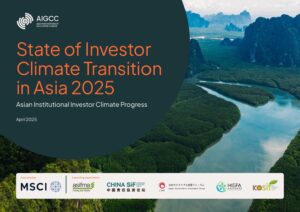AIGCC’s recent research finds a growing proportion of Taiwanese investors fare better than the Asian investor average on most climate metrics.
However, their climate-aligned investments still need to scale up to meet global and Taiwan’s climate goals, as well as more investment and actions to build physical risk resilience.
AIGCC assessed investors’ performance against metrics for managing climate risks and opportunities. The new data covers 10 of Taiwan’s largest and most influential institutional investors with 50.36 trillion NTD (US$1.7 trillion) in collective assets under management (AUM). AIGCC’s assessment provides a useful benchmark to understand the trajectory of mainstream capital within the Taiwanese market.
The data is an exclusive Taiwan-focussed extract complementing the sixth edition of the Asia Investor Group on Climate Change (AIGCC)’s annual flagship report, ‘The State of Investor Climate Transition in Asia 2025’, which reviews 230 of the most significant and influential investors across Asia.
With Asian investors highly exposed to climate impacts, AIGCC’s research highlights the need for more Taiwanese asset owners in particular to take on the mantle and lead asset managers in the climate transition.
In summary, the Taiwanese investor cohort is leading the average Asian investor across key climate aspects:
- Recognition of Climate Risks/Opportunities: This is now mainstream investment practice amongst Taiwanese investors as 90% of investors now recognise the financial materiality of climate change.
(vs. Overall Asia Investor Average of 75%)
- Overall Climate Stewardship and Corporate Engagement: 80% of Taiwanese investors report annually on their climate-stewardship and engagement activities (vs. Overall Asia Investor Average of 39%).
The majority of Taiwanese investors are performing better than the average Asian investor on climate stewardship and active ownership actions.
- Disclosure of Physical Risks/Adaptation Actions: 70% of Taiwanese investors have disclosed results of portfolio physical risk assessments, although actions to build resilience and adaptation to climate risks remain nascent.
(vs. Overall Asia Investor Average of 43%)
- Climate Solutions and Transition Finance: 60% of Taiwanese investors have a target, or disclose investment in, climate solutions investments, including transition investments and scaling up low-carbon solutions. Though generally, these only apply to a small portion of the portfolio.
(vs. Overall Asia Investor Average of 35%)
AIGCC has also identified key areas for Taiwanese investors to improve. Asset owners can take the lead and require more progressive climate considerations in asset management mandates with fund managers:
- Near-Term Climate Targets: 40% of Taiwan’s investors have set near-term climate goals (for example, 2030 or 2035 emissions reduction targets). Setting robust interim targets form the basis for investor transition plans and near-term strategies.
(vs. Overall Asia Investor Average of 36%)
- Climate Transition Plans: 40% of Taiwanese investors have a transition plan, while an additional 20% have ‘partly’ developed one. Development of comprehensive transition plans plays a key part of managing climate risks and opportunities in the transition to net zero.
(vs. Overall Asia Investor Average of 35%)
- Climate Corporate Engagement: 20% of Taiwanese investors have a climate engagement target. Such targets support investors to prioritise stewardship with most materially emitting corporates.
(vs. Overall Asia Investor Average of 20%, which is similarly low)
- Internal Policies and Approaches on Nature/Deforestation: 40% of Taiwanese investors have adopted policies or approaches on nature and deforestation. This indicates a growing recognition of nature-related risks and opportunities amongst Taiwanese investors.
(vs. Overall Asia Investor Average of 21%)
- Advocacy for Climate-Aligned Policy/Regulation: 10% of Taiwanese investors have disclosed climate-related policy engagement and actions.
(vs. Overall Asia Investor Average of 7%)
AIGCC CEO, Rebecca Mikula-Wright said: “We’re pleased to see that Taiwanese investors are increasingly displaying comprehensive climate risk management. We encourage Taiwanese asset owners to step up their climate leadership and continue to demonstrate their commitment to the climate transition.
“By setting climate-aligned mandates, asset owners can strongly influence asset managers’ asset allocation and stewardship efforts to be more climate-aligned. Investors across Asia should complement corporate engagement targets with robust asset alignment targets – these remain across the Taiwan institutional investor landscape. The Net Zero Investment Framework 2.0 outlines how investors can do this.
“The climate transition is an interconnected issue – climate mitigation and adaptation strategies need to be cross-sectoral and inclusive to ensure a just transition.
“Investors are keen to support the government’s effort to develop a framework for a nature-based solutions financing scheme in Taiwan, especially one that can support the government’s ambition to introduce more carbon sinks and flood protection measures.”
Cathay Financial Holdings Chief Investment Officer, Sophia Cheng, said: “Climate adaptation and nature-based solutions remain a critical consideration for us in the climate transition. It is our fiduciary duty as an institutional investor to consider the long-term returns for our beneficiaries. We look forward to strengthening engagement with businesses and policymakers to play our part in contributing to the nation’s climate goals.”
AIGCC will present more insights during an in-depth investor briefing held in-person in Taipei, Taiwan, on Thursday, 10 July 2025, focussing on data from AIGCC’s flagship report, State of Investor Climate Transition in Asia 2025 and the performance of Taiwanese investors. This will be followed by a peer exchange on embedding climate considerations across investor portfolios.
AIGCC thanks MSCI for their sponsorship of the report and event as well as Cathay Financial Holdings for hosting the event.
AIGCC’s ‘The State of Investor Climate Transition in Asia’ report is the most comprehensive and reliable snapshot of how decision-makers in the region’s capital markets are managing climate and nature; perhaps the biggest factors influencing the region’s long-term economic development.

Access the full report here